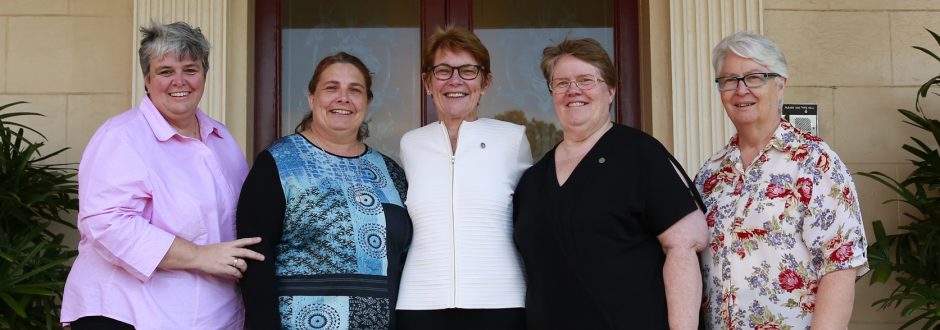Gathered in Sydney for their 26th Chapter Gathering from September 24 to October 2, 2017, and in the 160th year since their foundation as a congregation of religious women, the Sisters of the Good Samaritan have discerned a new Statement of Directions and elected a new leadership team for the next six years.
Of the 208 Good Samaritan Sisters who live and minister throughout Australia, and in Japan, the Philippines and Kiribati, 115 were present for the Chapter Gathering which deeply explored issues of importance for the world, the Church and the congregation in 2017 and into the future.
The newly-elected five-member leadership team responsible for the pastoral governance of the congregation until 2023 is Sister Patty Fawkner, Congregational Leader, and Councillors, Sisters Catherine McCahill, Meg Kahler, Marella Rebgetz and Veronica McCluskie.
“I’m humbled to be called by my Sisters to this ministry of leadership, but also, I’d have to say that I’m proud to be asked to lead this congregation which I love so dearly,” said Sister Patty Fawkner.
“I’m aware that leadership at this time in our world and in our Church is a mixed blessing. Organisations evolve to greater complexity, and this is true for us as Good Samaritans even though we are diminishing in numbers. So I’m amazed at how much at peace I feel. I know that I have the love and prayerful support of my Sisters and that fills me with confidence.”
Sister Patty described the overall experience of the Chapter Gathering as “fresh, engaging, energising and outward-focussed”. She said the congregation’s Statement of Directions for the next six years, which grew from a 15-month period of dialogue and discernment, “is a statement of which the Good Samaritan, St Benedict and our founder John Bede Polding would be proud!”
“Our Statement of Directions is faithful to our charism and tradition of our seeking of God and being called to be neighbour. And it’s focussed on the needs of our contemporary world,” said Sister Patty.
“It challenges us to work in partnership to respond to the needs of those people who are often left on the margins of society’s care and concern. This includes care for our fragile planet and our bruised and wounded Church. We recognise the conflict and animosity that exists between nations and sectors of society and we want to nurture a culture of mutuality, starting with ourselves.”
The Good Samaritan Sisters’ 2017-2023 Statement of Directions states: “As Good Samaritans, we listen to the Spirit calling us to act boldly and courageously: nurturing a culture of mutuality; committing ourselves to ecological conversion; fostering an ecclesial community; embracing God’s mission in partnership”.
“This Statement,” said Sister Patty, “is a vision for us, so we will need to spend time unpacking it and exploring its implications for our priorities, policies and projects. We are a small congregation… but we do have human and other resources to contribute to God’s mission.”
On the last day of the Chapter Gathering, the Sisters also released a statement of solidarity with Japan and the Asia-Pacific region in response to the “growing tensions” between the USA and North Korea.
“We observe with dismay the growing tensions between the United States of America and the Democratic Peoples’ Republic of Korea (North Korea) and between North Korea and Japan. We recognise that many people are suffering under the threat of attack and we stand in solidarity with the people of Japan and all those who live in fear of nuclear conflict,” the statement said.
“The escalation of tensions and threats between the USA and North Korea has brought our world to a potential disastrous conflict and we pray that, through respectful dialogue and mutual understanding we may be able to stand together and build a new way of looking at each other and our world that embraces our shared humanity. We pray that all nations will commit to nuclear disarmament and active peace-building.
“As Sisters, together with the Catholic community in Japan, and with people of peace in every community, we stand committed to dialogue and to working for peace as one human community.”
[Read in full the Statement of Solidarity with Japan and the Asia-Pacific Region here.]
About the Good Samaritan Sisters’ new leadership team
Sister Patty Fawkner is an adult educator, writer and facilitator with formal tertiary qualifications in arts, education, theology and spirituality. Born and raised in Sydney, Patty was professed in 1973 and has lived and ministered in New South Wales and Victoria. She began her ministry with the congregation as a primary school teacher, before taking on school principal roles. From 2002 to 2005 Patty was Director of Uniya Jesuit Social Justice Centre. She has collaborated with many groups in the Australian Church, including the Council for Australian Catholic Women and Catholic Religious Australia. Patty has served twice as a council member of her congregation’s leadership team.
Sister Catherine McCahill grew up in North Queensland before joining the Good Samaritan Sisters over 40 years ago. Since then she has lived in communities in New South Wales, Queensland, Victoria, South Australia and Japan. Her main ministries have been in secondary and tertiary education, and adult faith formation. After completing her doctorate on Jesus as teacher in the Fourth Gospel, Catherine was the Academic Dean at Yarra Theological Union in Melbourne where she also taught Scripture and religious education. Since 2011, Catherine has served as a council member of her congregation’s leadership team.
Sister Meg Kahler, originally from Warwick in Queensland, trained as a secondary school teacher and has worked in schools in Victoria, Queensland and New South Wales. Since joining the Good Samaritan Sisters in 1996, Meg’s ministry placements have included Director of the Kiribati Pastoral Institute and Manager of The Good Samaritan Inn in Melbourne. She is currently Co-ordinator of Formation and Partnership with Good Samaritan Education’s Mission Team where she develops formation and immersion programs and resources for staff and students in Good Samaritan schools. Meg has formal qualifications in arts, theology and education.
Sister Marella Rebgetz grew up on a cattle station west of Charters Towers in North Queensland. She joined the Good Samaritan Sisters 25 years ago and has spent more than a decade living and ministering on the island nation of Kiribati. With professional qualifications and experience as a water engineer, Marella worked on aid projects helping to address Kiribati’s critical water needs. In 2016-17, she undertook a well-earned sabbatical which took her to Israel/Palestine and the United States of America, where she participated in a variety of spiritual renewal programs.
Sister Veronica McCluskie was professed in 1965 and has a background in secondary education, adult faith formation and spiritual direction. In 1991 Veronica was the first Sister of the Good Samaritan to live and minister in Kiribati. There, she served on the teaching staff of the Kiribati Pastoral Institute and was also the first Director of Novices. Veronica has held leadership roles in the Australian Church as Executive Director of Catholic Religious Australia and Executive Officer of Catholic Vocations Ministry Australia. For the past five years she has been a member of the Good Samaritan Sisters’ Communities on Mission Team.
About the Sisters of the Good Samaritan
The Congregation of the Sisters of the Good Samaritan, colloquially known as “the Good Sams”, is Australia’s first ‘home-grown’ congregation of Catholic religious women. They were founded in Sydney in 1857 by Archbishop John Bede Polding, an English Benedictine monk and Australia’s first Catholic bishop.
Nourished by the Gospel parable of the Good Samaritan (Luke 10:25-37) and the ancient Rule of St Benedict, the Sisters’ spirituality is expressed in their commitment to community life, prayer, justice, hospitality and compassionate service. In 2017, over 208 Good Samaritan Sisters live and minister throughout Australia and in Japan, the Philippines and Kiribati.


